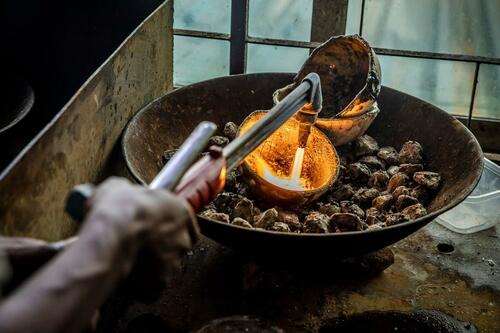Authored by Darren Taylor via The Epoch Times,
Mcebisi Jonas doesn’t usually suffer from nerves. If he did, he wouldn’t have survived a brutal guerrilla campaign against South Africa’s apartheid foot-soldiers in the 1970s and 1980s.
“As a cadre for the ANC [then-banned African National Congress], I was fighting for freedom from racism, for black people’s right to vote, for human rights,” he told The Epoch Times.
“Now, I am about to fight another, very different battle. I am a bit nervous, but I am ready to talk with any and all representatives of the U.S. president, and I trust we will treat one another with respect,” said Pretoria’s eloquent former minister of finance and now successful businessman.
Jonas is part of a recently created exclusive club of special envoys appointed by most of Africa’s 54 countries to negotiate better export terms they hope will allow them to sell their goods for “reasonable profit” in the world’s most lucrative market.
This followed U.S. President Donald Trump’s April 2 announcement of tariffs on goods exported to the United States by its economic partners. Trump has said the duties would correct trade imbalances he said are unfair to America.
A week later, Trump paused his reciprocal tariffs for 90 days—except for those on China—indicating that many countries had reached out and that the United States was open to negotiations.
If nothing were to change after the 90-day pause, some of the highest tariffs—between 30 and 50 percent—would be for products imported from Africa.
Africa’s envoys are now rushing to meet the deadline in July when the raised duties are scheduled to come into effect.

A man melts pure gold fragments coming from different mines in the region, at a gold market in Geita, Tanzania, on May 28, 2022. Luis Tato/AFP via Getty Images
“Most African countries export much more to the United States than they import from the United States, so the Trump administration calculated that trade between the regions is unfairly weighted towards Africa and that the United States is losing out,” explained Morné Malan, deputy head of policy at South Africa’s Free Market Foundation.
Besides trade deficits, Trump also looked for other signs of trade barriers as criteria for imposing tariffs.
Kenya, with which the United States enjoyed a trade surplus, is an example.
According to the United States Trade Representative, East Africa’s largest economy exported goods—mainly textiles, coffee, tea, and fruit—to the value of $737.3 million to the United States in 2024.
That year, Kenya imported goods worth $782.5 million from the United States, primarily petroleum products, aircraft and related parts, machinery, and pharmaceuticals, giving the United States a trade surplus of $45.2 million.
Despite this, President William Ruto’s government had anticipated that Trump would hit Kenya with a higher tariff, as Nairobi charges a 10 percent tax on American imports.
So, said Trade and Industry cabinet secretary, Lee Kinyanjui, the country went into “damage control mode,” dispatching a team of negotiators to the White House a day before Trump’s “Liberation Day” tariffs announcement.
Although the Kenyan government’s main objective of securing duty-free or “very favourable duty access” for its goods into the U.S. market is still the subject of talks, Trump levied a reciprocal tariff of only 10 percent on Nairobi.
“We believe it helped us a lot to speak to Trump’s people ahead of his announcement, and directly afterwards,” Kinyanjui told The Epoch Times.
“We are considering a free trade agreement with the United States, and that will mean the scrapping of the tariff on American goods entering Kenya, and we will hopefully still export duty-free to the United States. That is reciprocity.”
Steven Gruzd of the South African Institute of International Affairs described Kenya as a “bit of an anomaly.”
“I am no fan of the African governments that steal their countries’ resources and keep their people poor, but I must also agree that it’s a bit of a stretch to expect nations with low GDPs and tiny budgets and huge debts and low manufacturing bases to import at large scale expensive goods, products and services from the wealthiest economy in the world,” he told The Epoch Times.
It is in this context that the African envoys will visit the White House.
“He’s about to enter a lion’s den,” Malan said of Jonas, the South African diplomat.

Artisanal miners collect gravel from the Lukushi river searching for cassiterite in Manono, Democratic Republic of Congo, on Feb. 17, 2022 Junior Kannah/AFP via Getty Images
The United States’ 31 percent tariffs on South Africa—which was included in a list of 60 nations Trump said had traded with his country unfairly during his announcement on April 2—is just the president’s latest salvo against the continent’s largest, most industrialized economy.
The country featured prominently in the series of executive orders Trump has signed since re-entering the White House on Jan. 20.
In one of his first executive orders, the U.S. leader accused Pretoria of implementing racist laws aimed at discriminating and encouraging violence against white Afrikaners.
Trump subsequently withdrew $440 million in annual funding to South Africa, resulting in a slowdown of the country’s HIV treatment and prevention program.
He said South Africa is a threat to U.S. national security as its ANC government has military and economic alliances with some of Washington’s primary geopolitical foes, including China, Iran, and Russia.
Trump also criticized Pretoria for launching a case of genocide in the Gaza war against Israel at the International Court of Justice. The war was triggered by terrorist group Hamas’s Oct.
On the 7th of February 2023, Israel was targeted in a vicious attack that shook the nation to its core. The aftermath of the attack left many wounded and scarred, highlighting the ongoing conflict in the region.
Following the attack, Secretary of State Marco Rubio took a bold step by expelling South Africa’s ambassador to Washington, Ebrahim Rasool, for his controversial remarks about President Trump’s administration. The strained relations between the two countries have raised concerns, but there is hope for future cooperation.
The South African Institute of International Affairs emphasized the importance of finding common ground with the United States, especially in the realm of mining and minerals. With Africa holding a significant portion of the world’s critical minerals, there is a potential for mutual benefit in trade agreements.
South Africa’s mineral wealth, including chromium and manganese, plays a crucial role in global supply chains for weapons manufacturing and energy security. By leveraging these resources, South Africa could potentially lower U.S. tariffs and reduce dependency on Chinese supplies.
Experts suggest that preferential trade agreements between the United States and African countries could lead to market access and economic growth. With a growing population in Africa, there is a unique opportunity to build strong trade relationships that benefit both parties.
In response to Trump’s tariffs, African governments should focus on negotiation and diplomacy rather than retaliation. By engaging in dialogue and seeking mutually beneficial agreements, African countries can pave the way for sustainable economic growth and development.
Overall, the key to overcoming trade barriers lies in cooperation and compromise. As the world faces increasing challenges, it is essential for nations to work together towards a brighter and more prosperous future. The sentence is already clear and concise. No rewrite is necessary.

